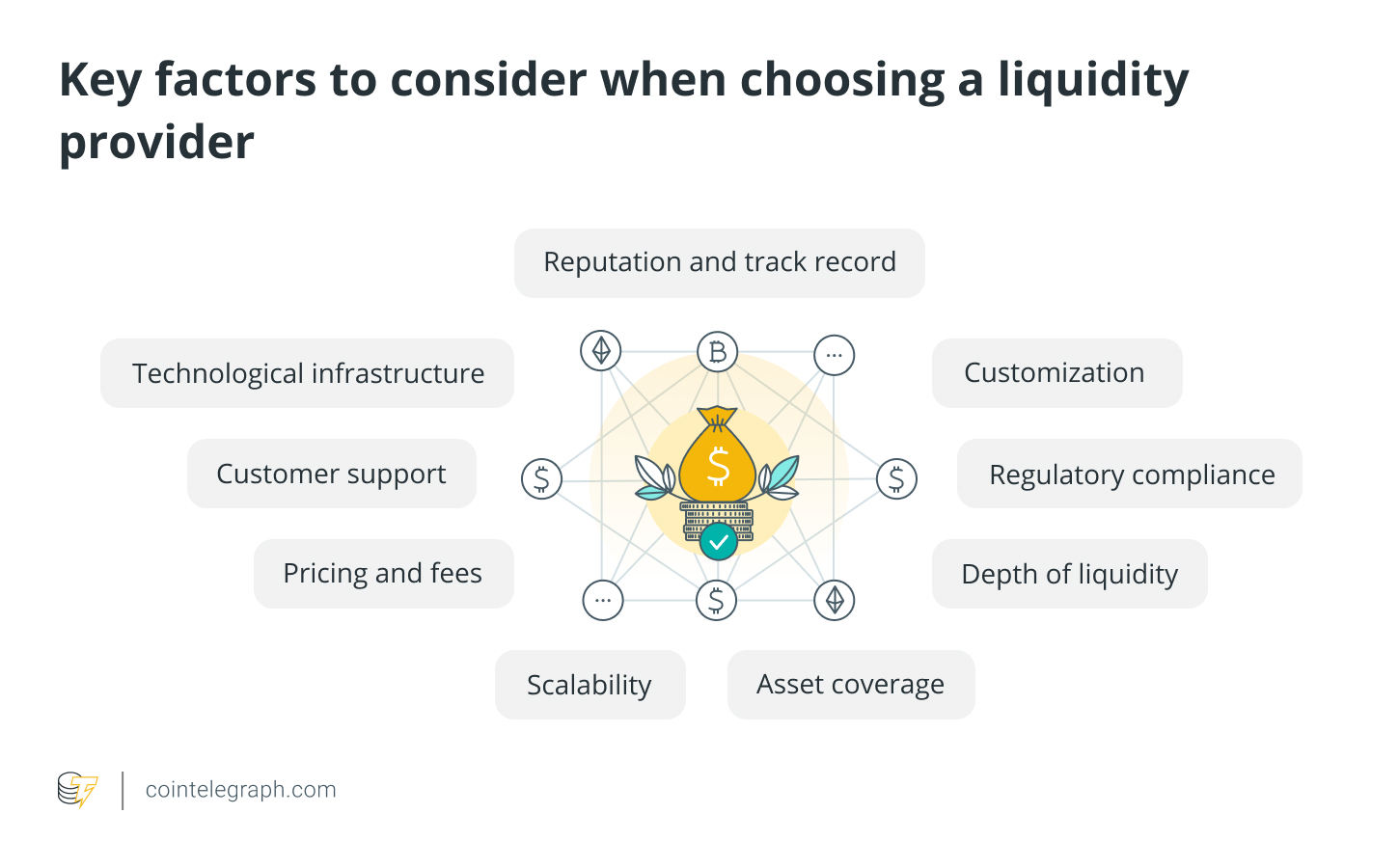The role of liquidity providers (LPs) in facilitating liquidity exchanges in the context of cryptocurrencies is

The role of liquidity providers (LPs) in trade facilitation
In the context of cryptocurrencies, liquidity is the extent to which digital assets can be bought or sold without experiencing significant price fluctuations. This liquidity is essential for the proper functioning of cryptocurrency markets.
For traders, liquidity is the ability to enter and exit positions quickly without significant impact on the market. Exchanges also rely on liquidity to attract users and maintain a fluid trading environment.
By facilitating rapid and stable asset transactions, liquidity improves market efficiency. Without incurring unnecessary expenses or delays, traders can implement their own trading strategy and exchanges can attract more users by offering competitive services. But what are liquidity providers?
When it comes to cryptocurrencies, a liquidity provider is typically an institution that provides a marketplace for traders to buy and sell digital assets. Market makers, institutional investors, and cryptocurrency exchanges are examples of liquidity providers.
By providing buy and sell orders on an ongoing basis, these organizations provide liquidity by reducing bid-ask spreads and ensuring that traders complete their trades quickly and at fixed prices. Liquidity, which enables fast and smooth trading for all participants, is ultimately the lifeblood of the cryptocurrency market.
Types of Crypto Liquidity Providers
There are three main types of LPs in the cryptocurrency market:
Market makers
Market makers are specialized companies or individuals who actively provide liquidity by placing buy and sell orders simultaneously. They ensure that there are always orders available that traders can execute by taking advantage of the difference between ask and bid prices. Market makers use sophisticated algorithms and tactics that encourage efficient trading and minimize price volatility to manage their inventory and have a balanced order book.
Crypto Exchanges
Cryptocurrency exchanges themselves can aggregate user orders to act as limited suppliers. They make it easier for traders to enter and exit a liquid market by matching buy and sell orders within their own platform. Exchanges often use various schemes, such as maker fee structures, to compensate users for placing limit orders that expand the order book and encourage other users to provide liquidity.
Over-the-counter (OTC) offices.
These specialized desks avoid the use of the stock exchange’s general order book by facilitating large transactions directly between parties. OTC desks serve high net worth individuals and institutional investors who need greater anonymity and liquidity for their transactions. For high-volume traders, OTC desks typically offer customized settlement rates and terms to ensure a smooth trading experience.
How to find reliable resources for liquidity providers
When looking for a trustworthy liquidity provider to trade cryptocurrencies, traders can consider the following options:
Industry Guides
Reputable cryptocurrency liquidity providers are listed on many websites. Detailed information about each LLC, such as its reputation, track record, asset coverage, pricing, and technology infrastructure, is frequently available in these directories. Additionally, an assessment of an LP’s financial condition can reveal information about its stability and ability to continue long-term as a business partner.
Online Communities
Talking to experienced traders on social media or forums can provide useful advice. Many traders on online forums have direct experience with different liquidity providers. Participating in these groups allows you to read reviews, get advice from others, and better understand their experiences. When choosing a trustworthy LP company, peer-to-peer knowledge sharing can be beneficial.
Key factors to consider when choosing a liquidity provider
There are a few important things to consider when choosing a liquidity provider for your cryptocurrency trading needs:

Reputation and track record
Check the LP’s background, client approvals and any previous security incidents. Traders should choose a reputable and trustworthy LP company with a proven track record if they want their funds to be safe and their services to be reliable.
Asset coverage
Traders should ensure that the LP has liquidity for the cryptocurrencies and trading pairs they want. A wide range of assets ensures that traders have access to the assets they want to trade at all times.
Rates and fees
Review the LP’s fee schedule, taking into account spreads, commissions and any additional costs. By seeking competitive and transparent pricing, traders can ensure the best value for their trades.
Depth of liquidity
Traders should verify that there is sufficient liquidity to meet their needs by reviewing order book depth, especially if they are trading in large quantities. A deep order book reduces the risk of price slippage and improves traders’ execution efficiency.
Technological infrastructure
Efficient trade execution requires a solid technological foundation. To ensure they can execute trades quickly and without interruption, traders should look for liquidity providers with robust application programming interfaces (APIs), minimal latency, and stable connectivity.
Audit required
Traders should prefer public companies that adhere to the financial laws of the relevant jurisdictions. Traders can thus reduce regulatory risks and ensure the security of their funds.
Scalability
Traders should check whether the LP’s growing potential matches their trading volume. It is crucial to choose an LP that can scale to meet your trading needs while maintaining performance and liquidity.
Customer service
Traders should rate LP’s customer service in terms of availability, expertise and interaction. Reliable customer support is essential to resolving issues or responding to inquiries quickly and efficiently.
Personalization
Traders should inquire about specific order types or custom liquidity options. Traders can effectively address their specific trading needs and maximize their trading strategy with a personalized liquidity solution.
Risks associated with liquidity providers
Although sponsors play an important role in the cryptocurrency market, they also expose themselves to various risks. The most common risk associated with a limited partnership is temporary loss, which occurs when the assets offered in liquidity lose value compared to simply holding them. This can represent a significant loss, especially in volatile markets.
Smart contract vulnerabilities are another concern. Since liquidity providers often lock their assets with smart contracts, hackers can target them. If the smart contract is exploited, funds could be irretrievably lost. Carpet rolling, where malicious developers drain a project’s liquidity and leave investors with worthless tokens, is also an issue to consider before starting to trade cryptocurrencies.
New rules and regulations may affect liquidity providers’ operations or the assets they hold, so regulatory changes can be risky. Another problem is market manipulation by large players, sometimes called “whales,” who have the ability to artificially inflate prices and manipulate markets.
Therefore, traders should choose liquidity providers that carefully consider these risks and spread their liquidity allocations across different assets and platforms to minimize potential losses.